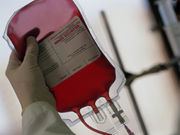Steps being taken to protect patients who need transfusions
FRIDAY, April 7, 2017 (HealthDay News) — U.S. blood banks are confident they have the tools to protect America’s blood supply from possible new Zika virus outbreaks during the upcoming mosquito season, according to research published in the March issue of Transfusion, a theme issue on Zika and other transfusion transmitted viruses.
Every blood donation in the United States undergoes testing for the presence of Zika virus, based on guidance from the U.S. Food and Drug Administration, Susan Stramer, Ph.D., vice president of scientific affairs for the American Red Cross, told HealthDay. About 40 U.S. donations have tested positive for Zika since screening began, mostly in Florida, Stramer said. U.S. blood banks use two tests that look for the genetic material of Zika in samples, Louis Katz, M.D., chief medical officer of America’s Blood Centers, told HealthDay. Any donations with potential infection are discarded.
Blood sample screening in the southern United States last year detected 23 potentially Zika-tainted donations out of 358,786. Fourteen of those samples, all from Florida, were judged as probably infected based on further genetic testing and interviews with donors, according to one of the new studies. Ten of the 14 donors reported travel to an active Zika transmission area within 90 days before donating blood, researchers reported. Two involved travel within the Miami outbreak area, while the rest involved travel to Puerto Rico, Jamaica, Trinidad, Mexico, Cuba, or the Dominican Republic.
A second study reported detection of five Zika-tainted samples out of 466,834 donations across the entire United States, all linked to travel in Central or South America. The cases occurred in Arizona, California, Nevada, New York, and Texas. Routine blood processing adds another layer of protection to the blood supply. A third study in the journal reports that Zika is inactivated when plasma is separated from whole blood and undergoes standard pasteurization.
Copyright © 2017 HealthDay. All rights reserved.








